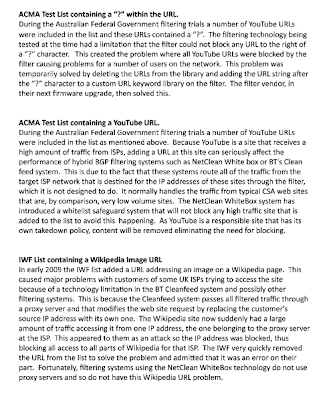
Friday, 20 November 2009
Going batty over feral humans. Animalia......[3]

Did Stephen Conroy's live trial of national ISP-level Internet filtering run into trouble?
Watchdog technology was used within a live trial of the Rudd-Conroy mandatory national ISP-level filtering of the Australian Internet.
It would appear that the Minister for Broadband, Communications and the Digital Economy may have run into a few problems in testing his ACMA blacklist if the white paper is to be believed.Perhaps this hints at the reason behind Senator Conroy's reluctance to release the live trial report, which has now been twice delayed with no guarantee as to when it will be published.
Thursday, 19 November 2009
GCP Carbon Budget 2008: a brief outline of the major global polluters
The Global Carbon Project Carbon Budget 2008* released on 17 November 2009 reveals that the atmospheric concentration of carbon dioxide (CO2) is now 385ppm which is 38 per cent above pre-industrial levels and, global emissions now stand at 8.7 PgC**.
This is a 2008 growth rate of 2 per cent (up 41 per cent on 1990 levels) and the highest CO2 level in at least the last two million years according to the report.
China, USA and India are responsible for 50 per cent of all global emissions, with 90 per cent of the increase in CO2 emissions from coal emissions between 2006-2008 coming from China and India.
Globally the fraction of total CO2 emissions which remain in the air has risen to 45 percent (a five per cent increase since 1960). It is suggested that the increase may be due to earth and ocean sinks declining in efficiency.
An estimated 20-35 percent of today’s emissions will remain in the atmosphere for several centuries into the future.
2008 Top Six Countries for CO2 Emissions From Fossil Fuels and Cement in MtC/yr (TcG/yr):1 CHINA 1922687
2 USA 1547460
3 INDIA 479039
4 RUSSIA 435126
5 JAPAN 357534
6 GERMANY 210480
Australia comes in at number 18 on this list with 96168 (down from 101086 in 2007 & 101458 in 2006). However our per capita emissions growth rate is still higher than many other comparable developed countries.
Carbon Budget 2008 full document including graphs here.
Carbon Budget 2008 Policy Brief here.
*Carbon Budget 2008 highlights.
**[1 Pg = 1 Petagram = 1 Billion metric tonnes = 1 Gigatonne = 1x1015g]
Nomination shortlist for the 2009 Australian Human Rights Awards and Medals
Print Media
- Ticking boxes: Part I and II
National Indigenous Times - Revealed: Australia's suicide epidemic
Ruth Pollard
The Sydney Morning Herald - Our schools for scandal
Sushi Das
The Age - Dying to be heard
Ruth Pollard
The Sydney Morning Herald - Diversity, Difference and Diagnosis (D3) - series
Copeland Publishing - 'Child' Magazines
Television Award
- Going back to Lajamanu
Debbie Whitmont, Michael Doyle, Kate Wild, Anne Connolly
Four Corners, ABC Television - Who killed Mr Ward?
Liz Jackson, Janine Cohen, Kate Wild
Four Corners, ABC Television - Kids' Business
People Pictures - My name is Jack
Helen Grasswill, Renata Gombac, Ian Harley, Quentin Davis, John Gunn
Australian Story, ABC Television - Foetal Alcohol Syndrome: Part 1 and 2
Suzanne Smith, Tony Jones, Brett Evans, John Bruce
Lateline, ABC Television
- Holding Our Tongues
Lorena Allam
Hindsight, ABC Radio National - Dementia and Anti-Psychotics: medication or management?
Natasha Mitchell and Anita Barraud
All in the Mind, ABC Radio National - Losing Erin
Kirsti Melville
360°, ABC Radio National - A Sense of Duty
Heather Stewart
360°, ABC Radio National - Crisis for Children
Ian Townsend
Background Briefing, ABC Radio National
- Ivan-Tiwu Copley
- Kate Locke
- Ikebal Adam Patel
- Doreen Green
- Joan Dicka
- GetUp! Action for Australia
- Accessible Arts
- The Human Rights Law Resource Centre
- ACON
- Centre for Multicultural Youth
The Native Title Market
David Ritter
Black Politics: Inside the complexity of Aboriginal political culture
Sarah Maddison
Culture is… Australian Stories Across Cultures: An Anthology
Anne - Marie Smith (Editor)
The Multicultural Writers Association of Australia
Blind Conscience
Margot O'Neill
Navigating Teenage Depression: A guide for parents and professionals
Gordon Parker and Kerrie Eyers







